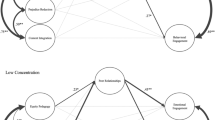Abstract
As a response to the attacks on ethnic studies in Arizona and the move to ban certain books, this essay presents theoretical and pedagogical reflections from two professors and addresses the ways teacher preparation programs can offer a resistance. Based on the authors’ experience in teacher preparation programs, one in the humanities and the other in mathematics, they discuss fundamental concepts that undergird social change methodology from Gloria Anzaldúa (la facultad and conocimiento) and from Isabel Gunning’s work (World Traveling). Ultimately, our premise is that teachers of teachers can impact the curricula in significant ways that result in dismantling racism and in teaching that is focused on positive social change. We posit that the university classroom where future teachers are trained must address (1) Equity issues, (2) Cultural identity or cultural framing, and (3) Culturally relevant strategies and teaching, modeled by the university professor.
Similar content being viewed by others
Notes
If one understands that Shakespeare’s The Tempest raises issues of equity and of subaltern subjects vis a vis power relations, it is not surprising that it would be on the list of banned books; however, it is surprising that a text from the literary canon of English Studies would appear on such a list. As Biggers explains in State Out of the Union, even one of the TUSD board members, Adelita Grijalva, was in “awe” of which books were on the list (2012b, p. 181).
The lesson study approach is a “process that Japanese teachers engage into systematically examine their practice with the goal of becoming more effective” (Lesson Study Research Group, n.d.).
The term “femicides” refers to the murders of over 600 women in Cuidad Juarez during the last 15 years. One of the films and two of the novels deal with this issue and thus students may choose to further research the topic.
For writing exercises Cantú employs in her classes, see Johnston (2008).
References
Alcoff, L. M. (2012, April 1). In Arizona, censoring questions about race. New York Times. Retrieved from http://opinionator.blogs.nytimes.com/2012/04/01/in-arizona-censoring-questions-about-race/.
Anaya, R. (1972). Bless me, Ultima. Berkeley, CA: Grand Coastal Publishing.
Anzaldúa, G. (1987, 2012). Borderlands/la frontera: The new mestizo. San Francisco, CA: Aunt Lute Books.
Anzaldúa, G. (2005). Let us be the healing of the wound: The coyoxauhqui imperative–la sombra y el sueño. In C. Joysmith & C. Lomas (Eds.), One wound for another/Una herida por otra: Testimonios de Latin@s in the U.S. through cyberspace (11 de septiembre de 2001–11 de marzo de 2002). Mexico, DF: Universidad Autónoma de México.
Banks, J. A. (2007). Educating citizens in a multicultural society (2nd ed.). New York, NY: Teachers College Press.
Biggers, J. (2012a). Tucson’s Mexican American studies director Sean Arce wins National Zinn Education Award. Retrieved from http://www.huffingtonpost.com/jeff-biggers/tucsons-mexican-american-_b_1399157.html.
Biggers, J. (2012b). State Out of the Union: Arizona and the final showdown over the American dream. New York, NY: Nation Books.
Bloom, B. S., & Krathwohl, D. R. (1956). Taxonomy of educational objectives: The classification of educational goals, by a committee of college and university examiners. Handbook 1: Cognitive domain. New York, NY: Longmans.
Cantú, N. E. (2008). Living to tell, telling to live. In B. A. Johnston (Ed.), Naming the world: And other exercises for the creative writer. New York, NY: Random House.
Castillo, A. (2008). The Guardians. New York, NY: Random House.
Crenshaw, K. W. (1991). Mapping the margins: Intersectionality, identity politics, and violence against women of color. Stanford Law Review, 43(6), 1241–1299.
Gay, G. (2000). Culturally responsive teaching: Theory, research, and practice. New York, NY: Teachers College Press.
Gay, G. (2002). Preparing for culturally responsive teaching. Journal of Teacher Education, 53(2), 106–116.
González, N., Moll, L., & Amanti, C. (2005). Funds of knowledge: Theorizing practices in households, communities, and classrooms. Mahwah, NJ: Lawrence Erlbaum Associates.
González, J., & Raleigh, E. (1996). Caballero: A historical novel. College Station, TX: Texas A&M University Press.
Gunning, I. R. (1995). Female genital surgeries and multicultural feminism: The ties that bind; the differences that distance. Third World Legal Studies, 13(2). Retrieved from http://scholar.valpo.edu/twls/vol13/iss1/2.
HB 2281. (2010). Senate Engrossed House Bill 2281. State of Arizona. Retrieved from www.azleg.gov/legtext/49leg/2r/bills/hb2281s/pdf.
Jordan, M. (2010). Arizona grades teachers on fluency: State pushes school districts to reassign instructors with heavy accents or other shortcomings in their English. Wall Street Journal. Retrieved from http://online.wsj.com/article/SB10001424052748703572504575213883276427528.html.
Lesson Study Research Group. (n.d.). What is lesson study? Retrieved from http://www.tc.columbia.edu/lessonstudy/lessonstudy.html.
National Council of Teachers of English. (1972). Students right to their own language. Urbana, IL: Author.
National Council of Teachers of Mathematics. (2000). Principles and standards for teaching school mathematics. Reston, VA: Author.
National Council of Teachers of Mathematics. (2008). NCTM position statement on equity issues in mathematics education: Actions for teachers. Reston, VA: Author.
Paredes, A. (1990). George Washington Gomez: A Mexicotexan novel. Houston, TX: Arte Publico Press.
Pérez, E. (1999). Decolonial imaginary: Writing Chicanas into history. Bloomington, IN: Indiana University Press.
Pérez, E. (2010). Forgetting the Alamo, or, blood memory: A novel. Austin, TX: University of Texas Press, Chicana Matters Series.
Powell, W., & Kusuma-Powell, O. (2011). How to teach now: Five keys to personalized learning in the global classroom. USA: ASCD Publications.
Rendón, L. (2009). Sentipensante (sensing/thinking) pedagogy: Educating for wholeness, social justice and liberation. Sterling, VA: Stylus Publishing.
Rodriguez, R. (2012). Arizona’s apartheid war against Mexican American studies. CommonDreams.org. Retrieved from http://www.commondreams.org/view/2012/01/03-5.
Sandoval, C. (2000). Methodology of the oppressed. Minneapolis, MN: University of Minnesota Press.
SB 1467. (2012). Reference title. Public Classrooms: FCC Compliance. State of Arizona. Retrieved from www.htps://lawprofessors.typepad.con/files/sb1467p.pdf.
Author information
Authors and Affiliations
Corresponding author
Rights and permissions
About this article
Cite this article
Ruiz, E.C., Cantú, N.E. Teaching the Teachers: Dismantling Racism and Teaching for Social Change. Urban Rev 45, 74–88 (2013). https://doi.org/10.1007/s11256-012-0225-2
Published:
Issue Date:
DOI: https://doi.org/10.1007/s11256-012-0225-2




